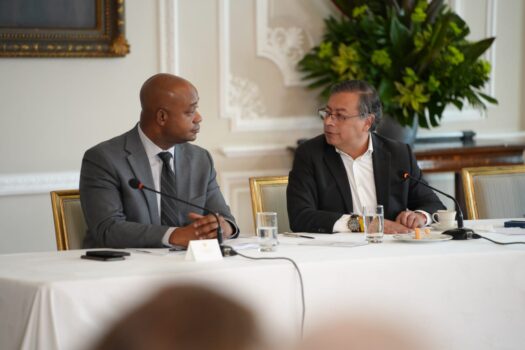Colombia’s Vice President Denounces The President As a Political Fraud
Colombia’s Vice President Francia Marquez has been on the outs with her running mate and current Colombian President Gustavo Petro for some time. While it was common knowledge that Marquez had strained relations with Petro and his administration, after three years, the animosity spilled out into the public. Specifically, Francia Marquez, who was elected as vice president alongside Gustavo Petro, and who brought an estimated 850,000 additional votes to the Petro presidential campaign.
Though Petro has cycled through ministers, Francia Marquez was popularly elected and cannot be removed from office by the President, though he can, and has removed her responsibilities, such as her appointment to the newly created “Ministry of Equality.”
“We are wanted in the photo but not in decision making. We are wanted as a symbol, but not as a people with a voice.”
In an emotional speech on July 25th, Marquez “canto la tabla” as is said in Spanish, in other words, give someone a “severe talking to” as she denounced what she says is the mendacity, hypocrisy, and bigotry of Petro and his administration.
“We are wanted in the photo but not in decision making. We are wanted as a symbol, but not as a people with a voice. We are wanted to be obedient and if we do not obey, then comes punishment, political violence, cancellation and public dehumanization,” said Marquez, in Spanish, giving a speech in Cali, near her home turf of the Colombian Cauca department.
The vice president spoke at an international women’s event called “Juntas por la Restauración de Nuestra Dignidad” (Together for the Restoration of Our Dignity) held at the Universidad Libre, or Free University of Cali. Marquez stated that she has held her tongue for a long time, but she had to speak in her defense after political rivals close to Petro have called her arrogant and a traitor.
“…But I soon went from being the political phenomenon, the heroine, to being the traitor. Because in this country, when a woman rises, suspicion follows her. The system does not ask about her abilities, but rather whether she is in the place she deserves. If she steps outside the assigned margin, then she is arrogant, disloyal, clumsy, incapable and dangerous.”
Marques also referred to the controversy surrounding her time leading the Ministry of Equality, where she has been denounced for a perceived lack of execution in setting up the new ministry or executing against its mandate.
“From the campaign until today, I have experienced many episodes of delegitimization, sabotage and exclusion. I will tell you just a few. I was given the mission of creating an institution with no structure, no resources, no support. They told me ‘do it yourself.’ And when I argued that three vice ministries were too many, they demanded [I appoint] five. And I did it despite the systematic blockade. They accuse me of not executing, when they never gave me the instrument to do so.” In this case, Marquez is referring to the President’s inner circle wanting her to appoint vice ministers of their choice as sinecures, irrespective of need or capability.
Gustavo Petro, with the appointment of Francia Marquez as his running mate, tried to position himself as a racial progressive in Colombia, a country with a complex social fabric that struggles to overcome classism, regionalism, and political polarization, along with ethnicity. However, his treatment of Marquez along with many bigoted statements he has made during his term, arguably have exposed him as disingenuous at best, and one could make the case, racist.
“No one who is black can tell me!”
President Petro insisted upon the appointment of porn stars Alejandra Umaña (Amaranta Hank) and Juan Carlos Florián to political positions, which Marquez opposed on the grounds of their lack of qualification. Petro angrily responded in a televised ministerial meeting saying “No one who is black can tell me that a porn actor who created the sex workers’ union should be excluded,” not explaining why a black person would be excluded from having an opinion on the topic, as opposed to anyone else.
Petro’s former foreign minister says comments are “unacceptable”
The bigoted statement drew a rebuke from Petro’s former foreign minister, former ambassador to the US, and former governor of Chocó, Luís Gilberto Murillo, who said: “Do not say that ‘I don’t accept that a black tells me such and such a thing,’ because that racializes the discourse in Colombia, and even worse when it comes from the presidency of Colombia. It’s unacceptable, because we need to advance this inclusive nation.”
Petro, along with his penchant for calling people who disagree with him “neonazis,” has also made racist comments against people with a white phenotype such as US President Trump and French President Emmanuel Macrón. Facing Macrón in a conference earlier this month, Petro said “It’s easier to win votes with a lie and a fetish, saying that life will be better if we expel those who don’t have the same skin color, language, or religion…”to which Macrón shot back: “I never lecture someone from the South, and it’s a little strange to be lectured by someone from the South, just because they come from the South!”
French President Emmanuel Macrón Rebukes Petro in Spain
Petro seems to fancy himself an orator and leader of what some call the “Global South” but no one seems willing to follow him. In his own country, support hovers around 26-30% according to recent polls, and his frequent verbal gaffes are constant fodder for jokes and internet memes. Winning his election by a tight mandate against an ailing outsider candidate who died a few months later, Petro constantly refers to his “popular mandate” as if he has the support of the Colombian populace.
By appointing Francia Marquez, an Afrocolombian lawyer and community activist as his running mate, Petro, a leftist ex-guerilla, sought to define himself as progressive and inclusive. However, three years into his presidency, he and his political clique openly despise Marquez, excluding her from public events and important meetings. During the opening of this summer’s congressional session, she was excluded from the presidential entourage and had to make her own arrangements, as is her constitutional right, to attend the legislative session. Marquez is a nationally elected official, and as such, she does not owe fealty to the president and has the right to dissent. Still, Petro’s attitude towards her and others destroys whatever credibility he claims as a feminist and inclusive crusader for human rights.

























